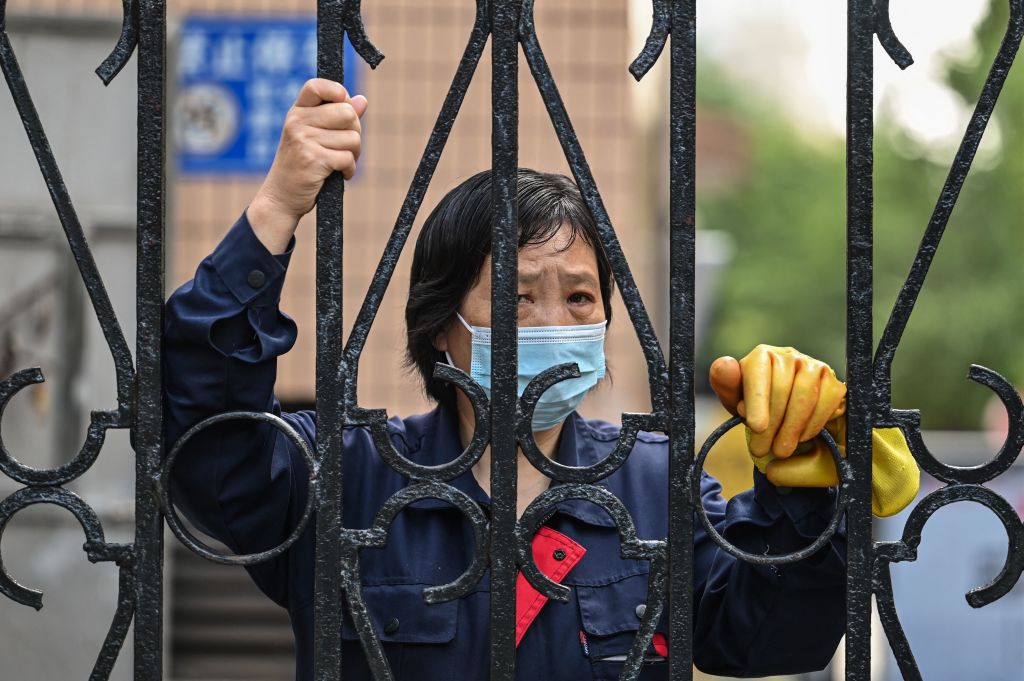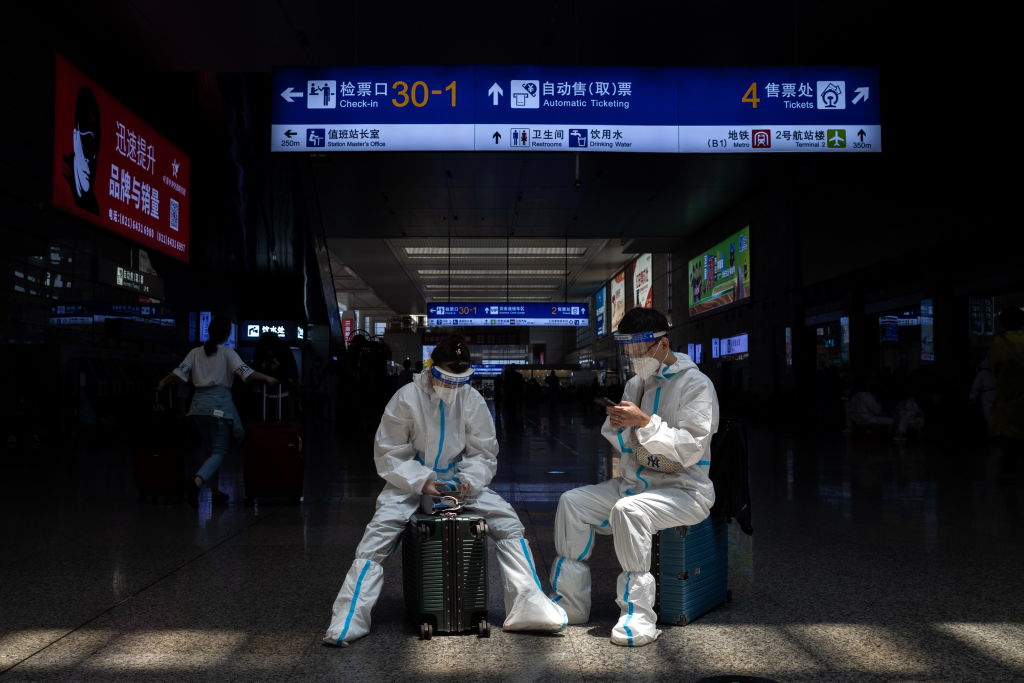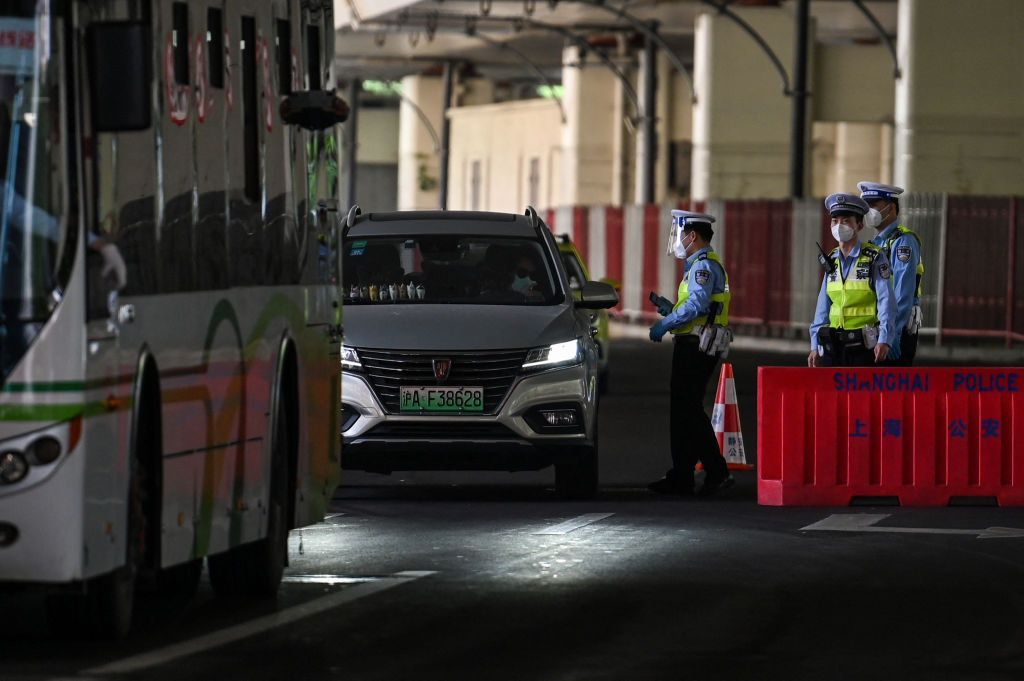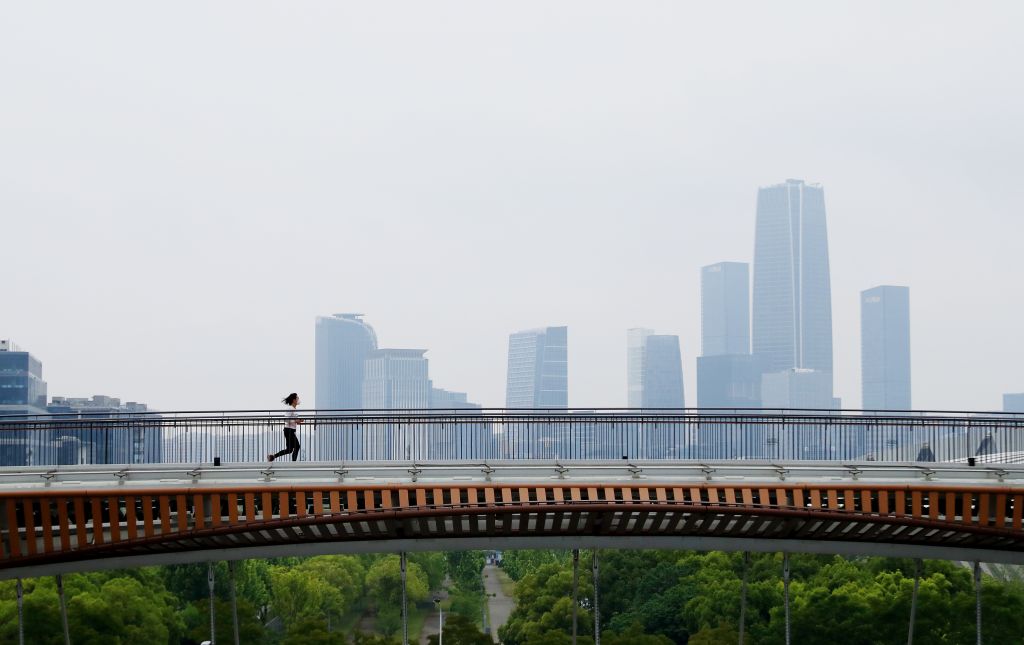
Violent clashes, mounting infections and vacant factory floors: the turmoil that’s engulfed tens of thousands of workers at an Apple Inc. supplier in Shanghai is a troubling symptom of China’s extreme efforts to keep factories humming during its worst Covid outbreak since 2020.
Trapped in a bubble for almost two months, locked down by government decree and walled off from the outside world, Quanta Computer Inc.’s mostly low-wage workers are demanding more freedom and beginning to revolt against their overseers, people familiar with the matter said, asking not to be identified for fear of reprisals.
Hundreds of workers have clashed with guards. A large contingent, worried that their supplies would run out should the lockdown persist, flooded past guarded isolation barriers earlier this month in search of daily necessities, according to several employees. Over the past weekend, media reports went viral of a large group storming a dormitory housing Quanta’s Taiwanese managers after a dispute over the prolonged lockdown and pay — triggering an hours-long standoff confirmed by several workers within the compound.
The incidents underscore how sentiment is souring on a lockdown that’s up-ended the lives of 25 million Shanghainese since March.
“People are getting frustrated and tired of these controls,” one of the workers said. “That’s inevitable, especially when there is no timeline on when all this will end.”
Read More: Shanghai’s COVID-19 Lockdown Pushes Residents to the Brink
Quanta and Apple representatives declined to comment for this story. In April, Quanta said in a filing to the Taiwan exchange that it was halting production at its Shanghai site and adopting measures in compliance with the local government’s regulations to protect its staff.
The upheaval at one of the most prominent manufacturers operating out of the affluent eastern Chinese region adds to the growing tumult across society and industry over virus curbs. The speed with which the situation escalated in Shanghai — home to marquee names from Tesla Inc. to General Motors Co. — is a stark warning to policy makers trying to stamp out infections through unprecedented quarantine measures. Worker unrest risks disrupting a vast manufacturing sector at a time China’s struggling to meet its official 5.5% growth target.
It’s not just laborers. In past months, college students in Beijing have rebelled; housing compounds have staged protests; and social media users posting critical videos have tried to outwit an army of censors.
Yet the chaos at Quanta exposes a more consequential breakdown in Beijing’s Covid Zero strategy: China’s mandarins have insisted that the world’s No. 2 economy can keep going amid lockdowns, through measures like those now in force at the MacBook maker. The reality is far more complicated.

The economic impact of China’s zero-COVID strategy
It’s unclear how widespread factory unrest is at the moment, but economists say Quanta is unlikely to be an isolated incident. Employees at the Shanghai factory who talked with Bloomberg News by phone asked for anonymity because they had not been authorized to speak publicly and feared retribution.
Most factories in and around Shanghai have gone into “closed loops” since late March, a mechanism hailed by China’s government as the most effective way to contain the spread of Covid while keeping the engines of the economy running. The system forces workers to live and sleep on factory sites — or in nearby accommodations. Now, Quanta’s experience may contain lessons for the other manufacturers operating in similar bubbles, that collectively make much of the world’s smartphones, laptops and computers.
The fallout is real and growing. China’s biggest chipmaker and a major iPhone supplier cut their outlooks for the second quarter. Apple — Quanta’s biggest customer — estimates Covid restrictions in China and other supply constraints will cost the company as much as $8 billion of sales. Even Tencent Holdings Ltd.’s billionaire co-founder Pony Ma shared a viral opinion piece on the economic costs of China’s strict Covid Zero measures.
Read More: COVID-19 Is Separating Children From Parents in Shanghai
“I don’t think closed loops are sustainable in the medium term as workers will eventually not be able to continue working in this way,” said Alicia Garcia Herrero, chief economist for Asia Pacific at Natixis SA. The closed loop system can only be a transitory solution even if the model succeeds in driving the economy, because the social burdens are mounting. “A healthy economy and society is much more than that.”
Quanta’s vast campus in the Shanghai suburb of Songjiang serves as both workplace and temporary home for unskilled migrant workers from across the country — as well as higher-paid engineers from Taiwan. Before the Covid outbreak, blue-collar workers would take shifts to make Apple’s MacBook and other laptops in a factory nearby. A standard dorm room houses 12 workers stacked in bunk beds, according to people who have stayed in the compound.

In the early days of the mandatory lockdown in April, Quanta had to shut most of its factory and seal workers in their dormitories. Production resumed at reduced capacity once management put in place a closed loop. The company continued to pay workers their basic salary of around 3,000 yuan ($450) that month, said a worker. That’s a fraction of the average wage in China’s richest city. Many felt failure to comply was tantamount to breaking the law. “Not complying with Covid measures is a violation of the law. You’d get caught for that,” one of the workers said.
But viruses don’t obey human laws. Covid snuck inside the compound just ahead of the lockdown, and crowded living conditions ignited a local outbreak, according to accounts by several employees.
Managers moved swiftly, commissioning buses — sometimes dozens at a time — to ferry positive workers to makeshift hospitals. But as daily infections in the city soared, some were asked to stay with their uninfected roommates until more transport could be arranged, said two workers. Quanta recalled employees that worked at their own residences, putting them into closed loops and subjecting them to daily, repeated testing.
Read More: Taiwan Is Abandoning Its COVID-Zero Strategy
As cases piled up, it began taking longer for test results to come back, stirring up frustration.
“Most of the workers in the factory are those recovered from Covid,” said one of the workers. “The company doesn’t want negative workers to resume work.”
Some of the consequences of the lockdown weren’t easily identifiable. Weeks in confined spaces took a toll on mental health as well, several workers said. Packed into their crowded dorms with little to do except await test results, employees smoked, played video games, complained about their confinement while exchanging stories about colleagues cracking under pressure.

Balancing economic growth and COVID protection
China’s financial hub has been slowly easing restrictions as its outbreak ebbs, with hardly any infections found outside of quarantined areas. Most residents are now allowed on limited trips outside their compounds. But the closed loops that Quanta and others have been operating in appear to be here to stay, and officials have signaled that they want the system expanded to other parts of the economy. Last week, the city said more than 800 financial firms can resume on-site operations so long as closed loops are used, while other officials repeatedly stress the efficacy of the model in containing Covid so far.
Tesla is still isolating thousands of its workers in disused factories and an old military camp to ensure they’re Covid-19 free. A representative for the company in China has said no further updates could be shared as yet regarding the factory’s status.
Meanwhile, the lockdowns continue to ripple through the global economy, with nearly 200 listed companies across the globe citing China’s measures as a drag on earnings this past quarter. Shortages of components for production and supply chain disruption are likely to persist through the year, executives in industries from semiconductors to electronics have said.
Closed-loops aren’t practically sustainable said Bruce Pang, head of macro and strategy research at China Renaissance Securities Hong Kong Ltd. They incur greater costs and not every company has the ability to provide food and accommodation for workers over a long period of time, he said.
Read More: What a Beijing Lockdown Would Mean for China and the World
The system also doesn’t help solve logistics issues, such as deliveries of raw materials and finished products, which is one of the biggest problems businesses in locked down cities are facing.
“China’s policy makers are still facing the trilemma of shoring up growth, achieving the maximum Covid prevention and normalizing social and economic life,” he said.
At Quanta, many workers say they have grown resigned to enforced quarantine in their adopted city. Shanghai has allowed people to leave, but trains are scarce after a spate of routes were canceled.
That means they could be confined to their campus for the foreseeable future.
“There’s also local lockdown policies on the other end that they’re expected to obey,” said one worker. “They just can’t go back home easily.”
—With assistance from Rachel Chang
More Must-Reads from TIME
- Inside Elon Musk’s War on Washington
- Meet the 2025 Women of the Year
- The Harsh Truth About Disability Inclusion
- Why Do More Young Adults Have Cancer?
- Colman Domingo Leads With Radical Love
- How to Get Better at Doing Things Alone
- Cecily Strong on Goober the Clown
- Column: The Rise of America’s Broligarchy
Contact us at letters@time.com